


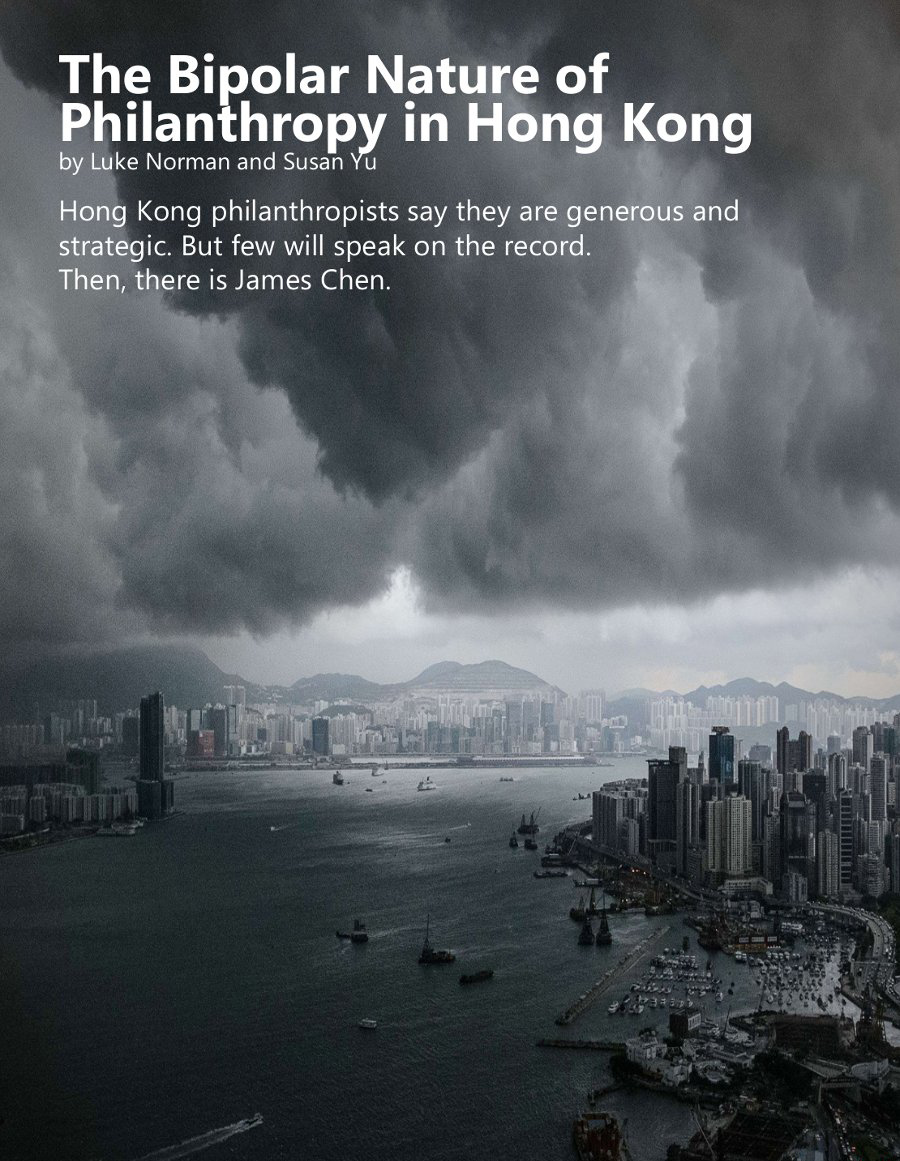
The protests and widespread student demonstrations that made headlines through the end of last year marked Hong Kong indelibly as a city in-between. An unabashed beacon of over-the-top 21st-century capitalism, Hong Kong’s putative manager, Leung Chun-ying, is known not as “the mayor” but as the city’s chief executive. Leung currently faces increasing opposition and calls for resignation as the representative of Beijing politics, yet under a recent ruling candidates for his job must be nominated by committee, effectively stifling the city’s hopes of self-governance.
While the ongoing unrest is recent, the rift between Hong Kong and mainland China is long-standing and has made the city one of the most politically complex places in the world.
Not surprisingly, similar polarities mark Hong Kong’s approach to philanthropy.
As the world’s ninth-largest economy, with more billionaires in its 426 square miles than in the whole of the UK, Hong Kong is an ideal host to thriving philanthropy: government social services are widely considered underfunded, income disparity is growing, and the underclass is crying out for attention.
Yet in Hong Kong, philanthropy keeps a mostly low profile. The silence and apparent fear of engagement that characterize the city's philanthropy are less a reflection of a dormant industry than a purposefully quiet one. From the long-running Tung Wah Hospital to newly innovative social entrepreneurism, philanthropic examples abound, but few practitioners seem to have any desire to talk about them. There may be more than 7,200 nonprofits in Hong Kong and donations in 2010-2011 topped $1.2 billion—with more than two-thirds of residents dipping their hand into their pockets—but philanthropists willing to go public are thin on the ground, especially considering that high-value gifts dominate the scene.
Gifts from middle-class donors in the city are still growing, but in 2012 alone, “104 donations worth $1m or more were identified in Hong Kong...with a combined value of $877m” according to a recent Coutts report. Most recently, Ronnie Chan, a property tycoon who shares his $3.2 billion net worth with younger brother Gerald, made headlines for a $350 million gift to Harvard, catching flak for supporting a university that was not only American but already well-endowed. As the recent Chan family trust donation bears out, Hong Kong’s philanthropists are not always quiet, but increasingly donor-critical public opinion shows why they might want to be.
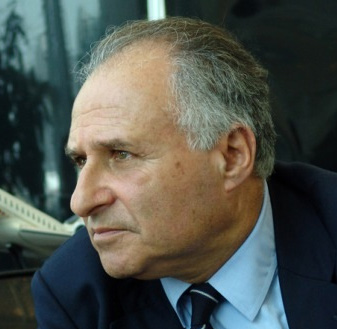 Sir Michael Kadoorie
Sir Michael KadoorieThe work of the Kadoorie dynasty, one of the richest and most famous families in Hong Kong, is a good example of the sector’s low-key style. More than 60 years ago, the Kadoorie Agricultural Aid Association was established as a community service for Chinese refugees spilling into Hong Kong from the Communist mainland. Over time the association morphed into the Kadoorie Farm and Botanic Garden, which now engages in environmental and conservation research.
With the growth of the Kadoorie fortune, its philanthropy has apparently diversified. Thanks to the family-run China Light & Power Company, along with the Hong Kong & Shanghai Hotel Group, the current scion, Sir Michael Kadoorie, landed the 115th spot on the 2013 Forbes Rich List, with a reported personal fortune of $9.5 billion. The Kadoorie Charitable Trust, founded in 1997, now directs most of Sir Michael’s philanthropy, supporting projects in China and throughout South and Southeast Asia. Still, a lack of public records makes it impossible to gauge its activities and a director of the Trust quietly explains, “The family doesn’t normally give interviews."
In fact, Sir Michael and the Kadoories have plenty of company. Sir Run Run Shaw, the famous movie maker and television magnate who passed away at 107 early this year, Sir Joseph Hotung and his older brother Eric Hotung, and Dr. Hari Harilela—a who’s who of Hong Kong’s recent heavyweights—are all entrenched in a generous but anonymous culture of giving.
That culture may be a product in part of the city's entangled religious past--ancient and largely culturally Buddhist, on one hand and more recently Christian due to British colonialists, on the other. More practically, there’s also an obvious financial motivation behind Hong Kong’s blockbuster giving: philanthropists get a tax break for their donations, so they may want to downplay their gain.
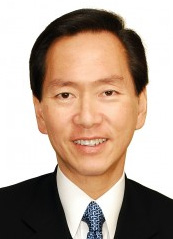 Bernard Charnwut Chan
Bernard Charnwut ChanStill other issues may factor into the pervasive secrecy. “Safety is the first thing that is in people’s minds,” Bernard Charnwut Chan says. Chan is a fourth-generation heir to a Hong Kong-by-way-of-Thailand fortune who also serves as Vice Chairman of Oxfam's regional operations. “It is the low-profile high-net-worth people who do not want to publicize their giving,” he adds. “Another reason is that they don’t want people to keep bugging them. Once they know you are a giver, the next thing you know you will have private bankers, lawyers and charities coming after you. So they like giving but they don’t want to advertise this and be chased.”
This keep-your-head-down approach isn't surprising in light of Hong Kong's continuing political unrest, with democracy protesters still blocking off access to some of the city's most expensive real estate as a part of ongoing demonstrations. In 2012, at the height of recent growth, the number of the city's millionaires rose by 40 percent. It rose by 27 percent over the last five years, according to a recent Wall Street Journal report. (At last count, Hong Kong ranked 20th in a list of countries with the highest number of millionaires.) Carry on up the ladder and the four richest men in Asia, with a combined wealth of $90 billion—Li Ka-shing, Lee Shau-kee, Lui Che Woo, and Cheng Yu-tung—all call Hong Kong home. By contrast, a recent study by the city’s chief executive’s office found that one in five residents lives in poverty; the region’s Gini Coefficient, a measure sometimes used to predict the potential for social unrest, also climbed into the danger zone in recent analyses.
For a city economy that is now based almost exclusively on high finance and real estate, there is little provision for a growing and increasingly vocal underclass. With the introduction of a city-wide minimum wage in 2011, some of Hong Kong’s last manufacturers fled for the cheaper, neighboring province of Guangdong to the north. Leung, who came into office vowing to reduce the record wealth gap, is trying to help the poor by increasing welfare spending, giving tax incentives to more than 400,000 OAPs (old age pensioners) and rekindling a long dormant policy permitting the subsidized sale of public housing. Backlash against Leung in recent weeks has been anchored in unrest over the near-future prospects of self-governance in Hong Kong as student groups blame the chief executive for mischaracterizing legislation that will require democratic candidates to be nominated by committee. But the form of protests has shown repeatedly that class division remains central to the discontent.
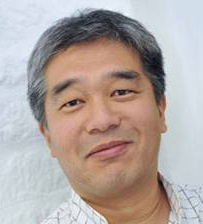 James Chen
James ChenIn the meantime, a few of Hong Kong’s philanthropists are seeking their own solutions and encouraging others to do the same. James Chen is the chairman of the Chen Yet-Sen Family Foundation, which has funded more than 150 social initiatives in Hong Kong, China, and West Africa. The foundation’s activities are unusual for being mostly public and uncommonly traceable.
“Part of our leverage is being able to reach out to other families,” Chen says. “It is about celebrating the successes and learning from the failures not only for us but for the wider community. Other wealthy families inclined to support philanthropy might have a different model to look at and to see what could be done.”
Initially, Chen recalls, his foundation chose a traditional, private route, even disdaining a website for its first few years. The change came with the realization that as positive news started to trickle back from beneficiaries to the funders, other potential stakeholders pricked up their ears and got on the telephone. The more successful the foundation became publicly, the more it was approached by interested philanthropists. Now, it not only supports active social projects, but also backs informal capacity-building gatherings in Hong Kong and China to enable nonprofits, volunteer groups, and individuals to similarly share information.
“People in Hong Kong are very generous with their money but [don’t] organize it well,” Chen adds. “They aren’t very deliberate in thinking about the impact or difference they have made with their philanthropy. It is more driven by emotion or business and not real philanthropy or meaningful engagement.”
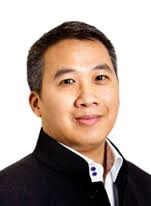 Darius Yuen
Darius YuenAnother philanthropist who is trying to change the giving culture is Darius Yuen, formerly a senior managing director at Bear Stearns. When the firm collapsed, Yuen saw an opportunity to reevaluate his life and decided that going to work in a worthy charitable cause was a good first step. Unsurprisingly, even flush with funds, he didn’t find what he wanted in a traditionally tight-lipped culture. “Part of me wants to solve social problems and try to figure out a solution to these social problems, whether it’s the environment, poverty alleviation, or education,” he says. “I believe that this world needs more solutions than just giving away money.”
Yuen travelled to Germany to attend the European Venture Philanthropy Association Forum and soon after founded the SOW Asia Foundation. The foundation has ploughed a mostly lonely furrow in Hong Kong, investing in commercial businesses that offer a high rate of social and/or environmental return. Grants have ranged from $50,000 to $250,000 to SOW Asia projects in Hong Kong, China, South and Southeast Asia, and Africa. From supplying low-voltage solar-powered computers to facilitating research into environmentally friendly building materials, Yuen has his hand in projects that would look perfectly at home in other venture philanthropy portfolios. In 2010, he was named one of 48 Heroes of Philanthropy in Asia by Forbes magazine.
But Yuen isn’t necessarily a hero in Hong Kong, where that kind of philanthropy is rare. “I don’t think people get the concept of venture philanthropy,” he says. “They are still confused as to which bucket to put their money in. They wonder, is it investment or is it philanthropy?”